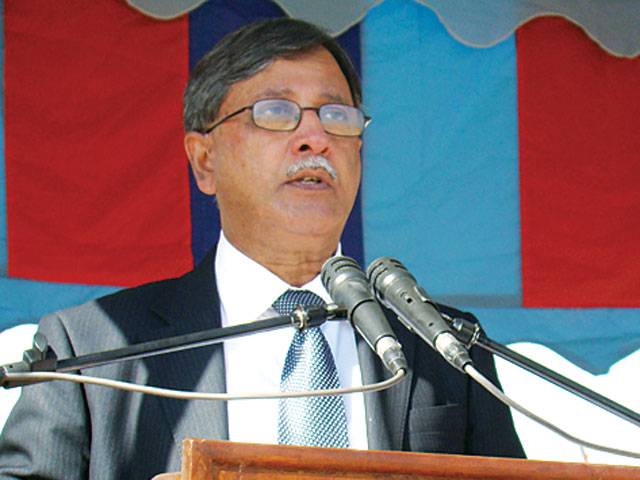ISLAMABAD - A top defence official has stepped down after supervising the country’s nuclear assets for nearly 14 years while turning down an official offer of an extension in job for the seventh time.
Regarded as a veteran in Pakistan's defence and strategic sectors, Lieutenant-General Khalid Ahmed Kidwai has called it a day as director general for the Strategic Plans Division (SPD) ahead of the completion of his service contract.
Kidwai has been replaced by Corps Commander Bahawalpur (XXXI Corps) Lt-Gen Zubair Mehmood Hayat. The slot of corps commander Bahawalpur has not immediately been filled in, military sources said.
A brief military statement released here Wednesday confirmed that Kidwai was replaced by Hayat, but did not give any further details.
Sources in SPD said Khalid Kidwai's one-year renewed contract was expiring on December 31, 2013, whereas the government wanted to give him an extension for the seventh time following the policy of continuing with the ex-general at SPD, considering his experience and expertise in the nuclear sector.
However, the former general is learnt to have refused this offer, saying the military's newly elevated top command should be allowed to have the people of his choice elevated to the SPD DG position. Under the official rules, the prime minister of Pakistan can grant extension to the SPD DG with or without the recommendation of the chairman joint chiefs of staff committee (CJCSC).
SPD sources said a summary for the grant of one-year extension to Khalid Kidwai was to be moved to the prime minister before the ex-military man refused to continue with his present assignment.
Kidwai may get another important assignment related to the security and strategic affairs including that of PM's advisor on national security or a presidential advisor dealing with the strategic issues or "something like that," officials believed.
Kidwai is Pakistan's longest serving boss in any defence or strategic establishment. He was placed in the strategic sector in 1998 and was made SPD DG in February 2000 when the then army chief Pervez Musharraf had set up a separate SPD establishment under the umbrella of National Command Authority. On October 6, 2007, following Kidwai's early retirement, Musharraf had appointed him as civilian SPD DG till December 31, 2008. Kidwai had proceeded on pre-retirement from the army after he was superseded following the elevation of General Tariq Majeed as CJCSC.
As a civilian SPD chief, Khalid Kidwai got yearly extensions during Pakistan People's Party’s government.
Under Kidwai's command, the SPD drafted its 10-point nuclear doctrine based on the policy of no first use or deterrence. The successful tests of Pakistan's short and medium range ballistic and related missiles in the recent years are all largely credited to Kidwai.
In July 2008, Kidwai and Dr Abdul Qadeer Khan had locked horns after Khan accused the army and Musharraf of having hand in nuclear proliferation. Kidwai hit back to pay in the same coin. "We have solid evidence about Dr AQ Khan's involvement in the nuclear proliferation to three countries North Korea, Iran and Libya. This evidence could be shared with the members of a panel, which may consist of parliamentarians and judges," Kidwai had told a rarely addressed media briefing then, while proposing the constitution of an impartial committee to probe the nuclear scientist's accusations.
Kidwai had also rejected Dr AQ Khan's allegation that the military, under Musharraf's command, had passed on centrifuges to North Korea in the year 2000.
In an informal interaction with the journalists in December last year, the Secretary Defence Lt-Gen (r) Asif Yasin Malik had mentioned of some Western states, which, according to him, were against Pakistan's nuclear programme. Lt-Gen (r) Khalid Kidwai, SPD sources said, had contacted the secretary defence to tell that his statement was uncalled for and it could re-ignite the controversies attached to the nuclear programme.
Thursday, November 21, 2024
General Kidwai calls it a day at SPD
Refuses govt's offer to get another extension | Supervised Pak nuclear assets for nearly 14 years | Hayat new SPD DG

3:43 PM | November 21, 2024
Punjab eases smog restrictions
10:09 PM | November 21, 2024
IHC directs Interior Minister to negotiate eacefully with PTI ahead of protest
10:07 PM | November 21, 2024
CJCSC highlights Pakistan’s defense potential at IDEAS 2024
10:06 PM | November 21, 2024
Customs foils gold and iPhone smuggling attempt at Lahore airport
6:52 PM | November 21, 2024
Interior Minister urges respectful talks, rejects dialogue under threats
6:16 PM | November 21, 2024
-
Hunger crisis to increase in South Sudan, warns UN
-
Hunger crisis to increase in South Sudan, warns UN
-
Pakistan’s judiciary champions climate justice at COP29 in Baku
-
Punjab struggles with persistent smog as Met Office forecast rainfall
-
Punjab residents face escalating smog crisis as pollution levels soar across country
-
Qatar says Hamas 'no longer welcome' in Gulf state
Land of Vigilantes
November 21, 2024
United in Genocide
November 21, 2024
Finally Fighting Back
November 21, 2024
Digital Stagnation
November 20, 2024
Xi’s Red Lines
November 20, 2024
Independent Supreme Court
November 21, 2024
Fat Loss Fantasy
November 21, 2024
Tackle Corruption Within School Boards
November 20, 2024
To Be Opportunistic
November 20, 2024
Democratic Backsliding
November 20, 2024
ePaper - Nawaiwaqt
Nawaiwaqt Group | Copyright © 2024





